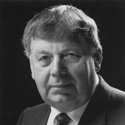
Waterloo Region is facing significant manufacturing job losses. Since January of 1990, over 25 plants have closed with the loss of 2,700 jobs. From his experience, Milo Shantz is well aware of the interdependence of the manufacturing and service sectors of the economy.
It is wise for us to consider some of Milo Shantz’s reflections on this situation and how to stimulate local job creation.
Entrepreneurship and Risk are two complementary ideas that have motivated Milo Shantz from an early age.
- At the age of 13 he started buying and selling pigs.
- When he was 21, he bought 500 turkeys with a partner.
- By 1958, with his father and brother, he started a family corporation.
As growth took place he involved other share holders (usually employees). This small operation grew, and in 1970, after many corporate changes, Milo and a group of shareholders founded Hybrid Turkeys. Milo was active with Hybrid Turkeys until 1981 when the company was sold to British Petroleum.
When Milo looks back at the myriad of small economic ventures that were created -- a rendering plant, many turkeys farms and feeding operations, to name a few -- he considers that all his partners enjoyed this small entrepreneurship. These partnerships meant groups of people sharing risk by investing $10,000 each to create economic ventures that created jobs and work for the entrepreneurs.
Milo consistently asks the question, “do we do enough of this shared-risk small business investment now?”
The 1950’s and 60’s were great years when the Canadian agricultural community had the goal of feeding the world. There seemed no end to the need for production.
But as is natural, agriculture has changed, partly because the world is feeding itself, partly from changes in eating habits. Milo Shantz asks some serious questions now, in the age of free trade, with agriculture and manufacturing changing rapidly.
What will Ontario and Waterloo Region be noted for? Where will people be employed? Are we really thinking ahead?
These are the kinds of questions that Milo constantly challenges people to consider.
Mercedes Corporation continues doing what it has become noted for:
- Expanding the Farmers Market where 400 entrepreneurs earn a living,
- The development of a large factory outlet mall; as well as adding space for small manufacturers and direct retail.
These ideas involve many owners, share holder employees and outside investors. Together they motivate each other to manage well, work for profit and fulfill a need.
Beyond these ideas Milo delights in seeing business ventures prosper whether he is directly involved or not. He gladly shares his insights with people who are starting in business or who face major business decisions.
Employee ownership has become a fundamental ingredient in the businesses created and inspired by Milo Shantz. From the beginning he sought out partners who were willing to share risk through investment. This concept has grown and expanded in line with the growth and development of Mercedes Corporation and the Stone Crock Inc.
The same ideas have been transferred to the small business tenants of St. Jacobs and the Farmers Market tenants. The concept has more than merit - it has results. The Mercedes Corporation, and the businesses indirectly connected with, employs over 1,500 people. The majority of these are either share holders or are small business owners or vendors.

